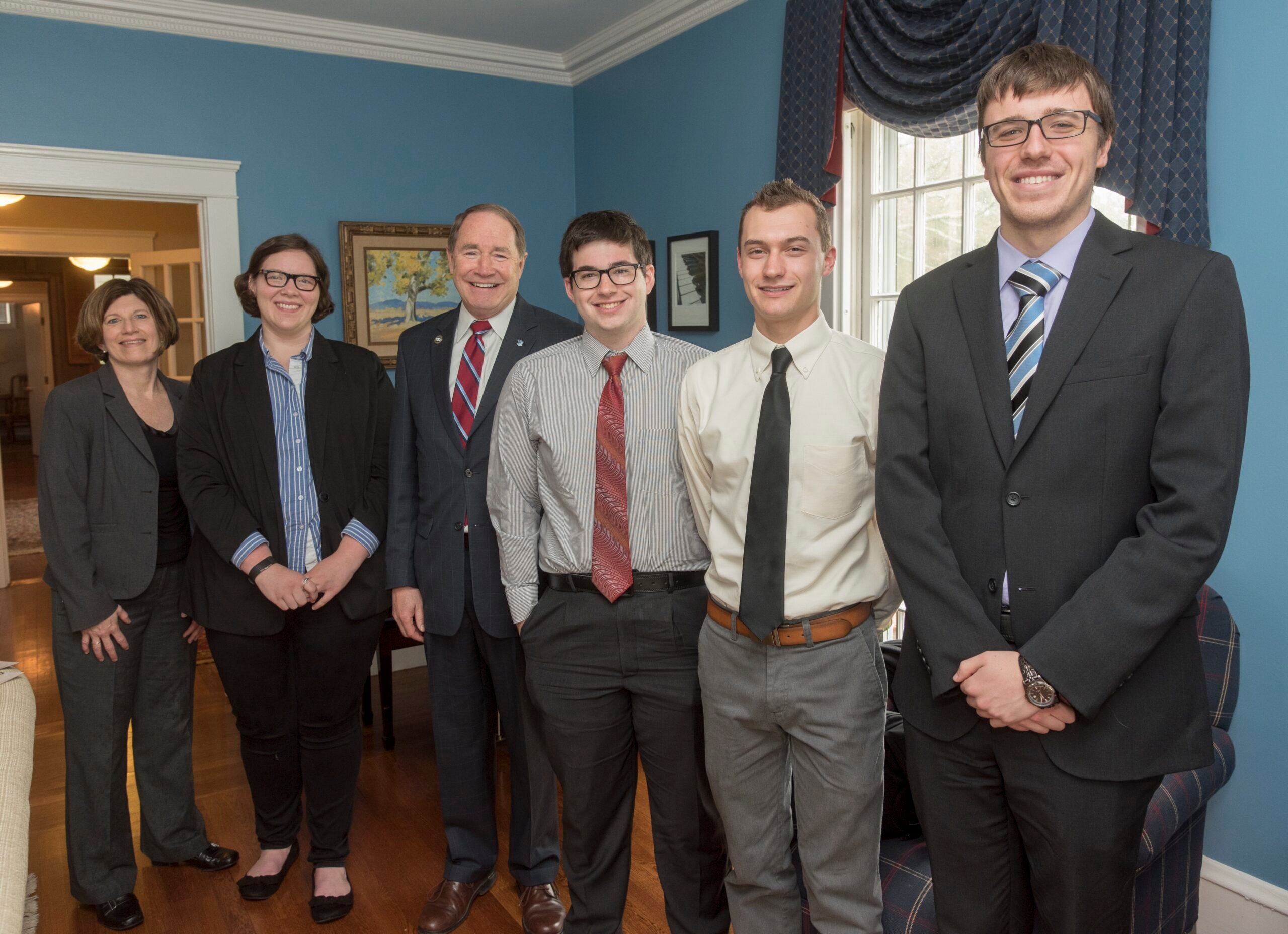KINGSTON, R.I. – April 27, 2017 – Four University of Rhode Island students have been awarded $20,000 Boren Scholarships to study foreign languages abroad – one each in China, Jordan, Morocco and Mozambique.
The recipients are Samuel Browne, a junior Chinese and chemical engineering major from Portsmouth; Evan Cummiskey, a sophomore political science and history major from Warwick; Zöe Mitchell, a junior political science major from Newport; and Joe Silva, a senior medical laboratory science major from Warwick.
The David L. Boren Scholarship is one of the most prestigious study abroad awards offered to American college students. The National Security Education Program, a federal initiative to expand the pool of American citizens with foreign language and international skills, sponsors the scholarship. In exchange for funding, recipients agree to work for the federal government for at least one year.
Browne will spend a year studying Mandarin Chinese and engineering in Nanjing and Suzhou, China, as he simultaneously completes the URI International Engineering Program and the University’s Chinese Flagship Program.
“I believe that studying Mandarin is of great importance in the American workforce today, especially with the large quantities of trade that occur between the U.S. and China,” he said. “Having grown up in a Western culture and civilization, I wanted to study the history and culture of Eastern civilization, and I believe that studying Mandarin would be an excellent way to do so.
“I always wanted to increase communication with more people around the world, and since Mandarin is a modern language spoken by many people, it seemed like a great opportunity,” he added.
Browne is an intern at Teknor-Apex in Pawtucket, and he hopes to intern at the company’s facility in China during his year abroad. His career objective is to be “a global engineer that focuses on international relations as it pertains to the engineering world.”
Cummiskey will spend his junior year in Amman, Jordan, in an intensive Arabic language curriculum that includes cultural immersion activities and a pledge to speak only Arabic – day and night – for the duration of the nine-month program.
“I’ve always really liked Jordan – its history, geography and its politics,” he said. “Jordan continues to remain a stable country despite the Syrian civil war and ISIS to its north, massive refugees flooding into the country, and a lack of natural resource wealth. I hope my time there may lead to a future of public service work in the country and region.”
Cummiskey said that learning Arabic unearthed his passion for languages, and it became the main focus of his academic career at URI.
In addition to the Boren Scholarship, this year he also earned a Beatrice S. Demers Foreign Language Fellows Scholarship to help fund his trip to Jordan, as well as a Critical Language Scholarship from the U.S. Department of State enabling him to participate in an Arabic language program in Oman this summer. After he graduates in 2018, he plans on a government career in defense, intelligence or at the State Department.
Mitchell sees the Boren Scholarship as an opportunity to launch a career in public service, so she will travel to Meknes, Morocco, next fall to study Arabic and international relations.
“I chose to study Arabic in Morocco because it is one of the United States’ oldest allies and important trade, counterterror and international development partner,” she said. “Being able to learn standard Arabic as well as the local dialect of the country will be an invaluable skill for the future career that I hope to have as an intelligence analyst.
“It’s also an incredibly beautiful country with a rich history and culture,” Mitchell added.
The winner of the Stephen Wood Award for Political Theory and the David Warren Scholars with High Distinction Award, Mitchell is particularly interested in the role religion plays in politics and culture. She plans to attend graduate school and eventually work in the State Department’s Bureau of Intelligence and Research.
Silva, who completed his degree requirements in just three years and aspires to earn a doctorate in epidemiology, plans a career in public health. He applied for the Boren Scholarship because it links language learning with national security.
“Infectious disease crosses borders, and learning a language can be very useful in the public health field when interacting with local communities facing outbreaks,” said Silva, who was awarded a Summer Undergraduate Research Fellowship last summer and will receive an Academic Excellence Award in May as the highest ranked senior in the biotechnology program.
He will travel to Maputo, Mozambique, for a semester to study Portuguese as part of the African Flagship Languages Initiative, which will begin with an eight-week language program this summer at the University of Florida.
“I’m very excited to learn Portuguese because my grandparents are immigrants from Portugal, and I have always been interested in studying the language,” Silva said.
“Mozambique itself represents a significant place to me in my interest in global health due to its location in Sub-Saharan Africa,” he continued. “Many new and re-emerging infectious diseases have traced their origins to this region of the world, and having the opportunity to spend time learning the culture there is something I’ve very excited about.”
(Photo by Michael Salerno.)

